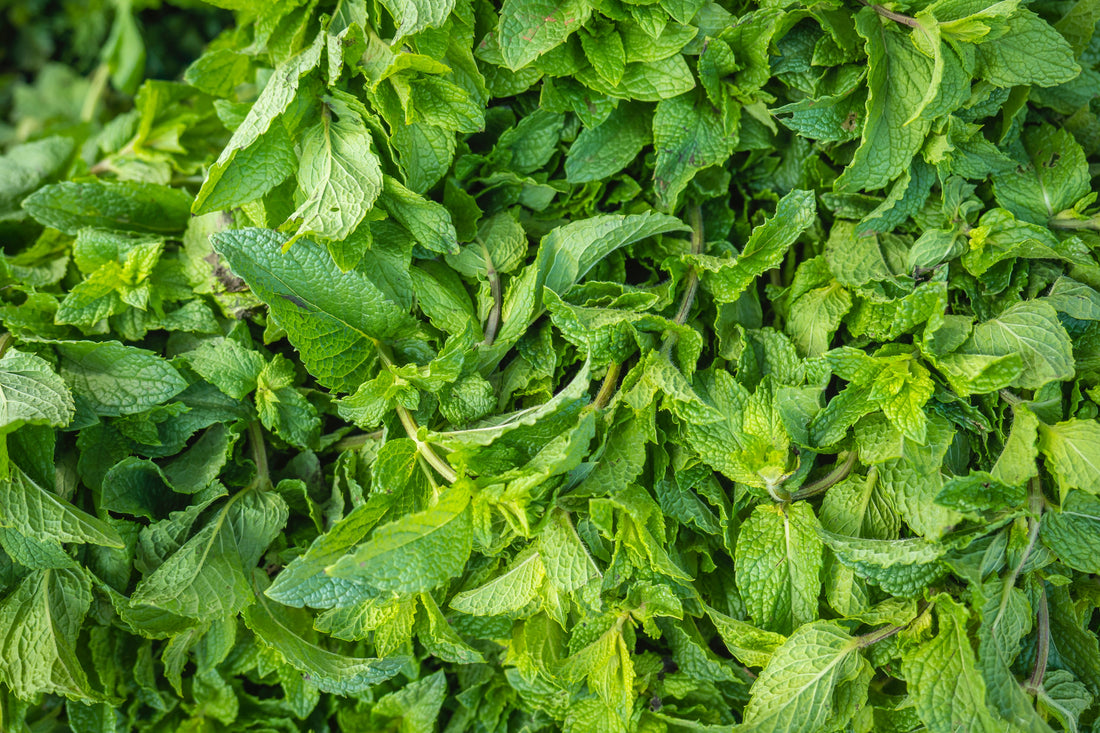What is Peppermint Essential Oil made of?
Peppermint Essential Oil comes from the leaves of the hybrid Mentha × piperita, commonly known as Peppermint. This perennial plant is a cross between watermint and spearmint, native to Europe and the Middle East but now widely cultivated worldwide.
The properties of Peppermint Essential Oil are primarily due to its main compounds, menthol and menthone, which are recognized for their invigorating and cooling effects.
- Latin Name: Mentha × piperita
- Main Country of Origin: India
- Scent Note Type: Top note with a strong, fresh, and minty aroma
- Most Popular Usage: Aromatherapy and Digestive Aid
What are the benefits of using Peppermint Essential oil?
Peppermint Essential Oil offers a range of potential benefits:
- Mental Focus: It is known to enhance concentration and alertness.
- Pain Relief: Its cooling sensation can help alleviate headaches and muscle pain.
- Digestive Aid: It may relieve symptoms of irritable bowel syndrome.
- Energizing: It's invigorating scent can boost energy levels and mood.
How to use Peppermint Essential Oil?
- Aromatherapy: Add a few drops to a diffuser to invigorate your senses and promote focus.
- Topical Treatment: Mix it with a carrier oil and apply to the skin to relieve pain or apply to the temples to help with headaches.
- Inhalation: For nasal congestion, add a few drops to hot water and inhale the steam.
How to combine Peppermint Essential Oil with Carrier Oils
Peppermint essential oil pairs well with carrier oils like jojoba oil, coconut oil, and grapeseed oil. For topical use, combine 2-3 drops of Peppermint Essential Oil with a tablespoon of your chosen carrier oil.
For an invigorating diffuser blend, add 4-5 drops of Peppermint Essential Oil to the recommended amount of water in your diffuser.
Research based on Peppermint Essential Oil
"Peppermint Oil Promotes Hair Growth without Toxic Signs" (2014): The study showed that peppermint oil could stimulate hair growth by increasing dermal thickness, follicle number, and follicle depth.
"Effects of Peppermint Tea on the Subjective Evaluation of Alertness and Mood" (2021): The research suggests peppermint tea (and by extension, peppermint oil) can enhance mood and cognitive performance.
"Peppermint Oil Solution is an Effective and Safe Medication for the Symptomatic Relief of Pain in Irritable Bowel Syndrome" (2020): The study revealed that peppermint oil solution is a safe and effective treatment for abdominal pain in IBS.
Frequently Asked Questions
Q: Is Peppermint Essential Oil safe for all skin types?
A: Yes, but it should always be diluted with a carrier oil. It's recommended to perform a patch test before using it widely on your skin.
Q: Can I ingest Peppermint Essential Oil?
A: It depends upon whether the manufacturer has produced the oil to be ingested or purely for topical and aromatic purposes. For example, Avivni's Peppermint Essential Oil has organic and purity certifications, however, we still don't recommend ingesting essential oils without consulting a physician (or holistic physician) simply because every person's body reacts differently. No essential oil should ever be ingested in its pure, undiluted form.
Q: Is Peppermint Essential Oil safe for pets?
A: Cats and dogs are very sensitive to essential oils and many are even harmful or poisonous to them. Diffusers for aromatherapy should be placed high up and not near food and water bowls. There are products especially formulated for pets that have been vetted for safety and diluted to the appropriate strength and we suggest you stick with these. We recommend always checking with a holistic veterinarian before using an essential oil product on your pet.
Q: Can Peppermint Essential Oil be used during pregnancy?
A: Pregnant women should always consult with a healthcare provider before using any essential oils.
Q: Does Peppermint Essential Oil have a shelf life?
A: Yes, it's best to use it within 3-4 years of opening.

